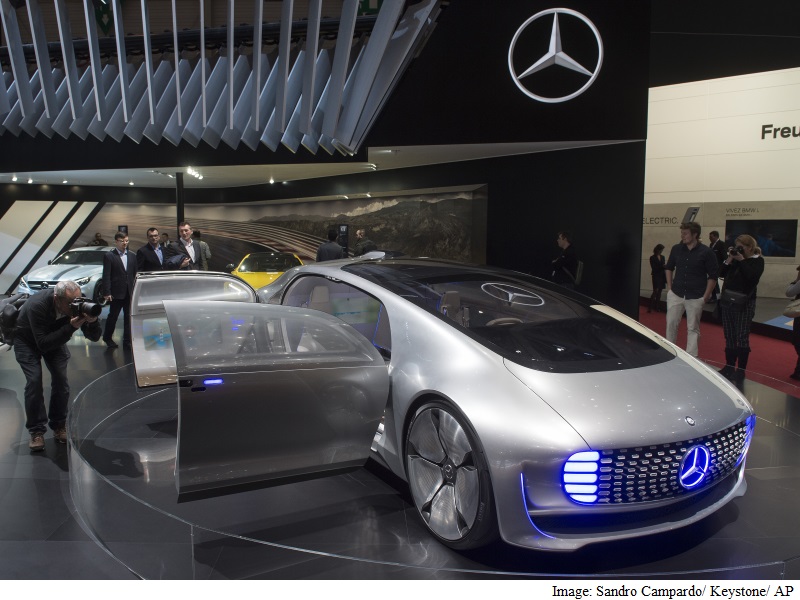- Home
- Others
- Others Features
- Different Paths Could Lead to Autonomous Cars
Different Paths Could Lead to Autonomous Cars

But they might arrive just as much by evolution, with everyday cars getting gradually smarter, as by sudden shifts to fully self-driving vehicles.
Autonomous driving - and its potential for sweeping change - was much on the minds of top auto executives at the Geneva International Motor Show.
The exhibit space in Geneva was mostly used for the show's primary purpose: showing off product to the news media and the public in order to boost sales. The display stands were dominated by expensive sports and luxury cars for the rich and new SUVs for more middle-class buyers.
But the future beyond the upcoming model year was very much a topic of discussion, if less visible on the display stands. Executives think that cars that drive themselves at least part of the time may be upon us by the end of this decade. Technology such as autonomous driving by cars equipped with cameras and radar sensors could blend with Internet connections and apps. For instance, a car could be ordered for a few hours through an app and drive itself to the customer.
Google, meanwhile, is testing completely autonomous cars on streets in Mountain View, California, Austin, Texas, and Kirkland, Washington.
Daimler CEO Dieter Zetsche said his company sees "two roads to full autonomy, one being the more evolutionary one where basically more and more assistance systems kind of automatically lead to a fully autonomous car."
"The other one is more revolutionary ... where first in restricted areas you have fully autonomous cars and over time you expand the area where you can do that," he said. "And I would say in restricted areas you can see fully autonomous cars in the latter path around the turn of the decade."
Some vehicles at the Geneva show made the case for evolution. The Mercedes-Benz E-Class luxury sedan from Daimler AG already offers wide-ranging, optional driver assistance technology. The latest version of the car can avoid collisions at intersections by recognizing crossing traffic and braking. It can help drivers fight crosswinds, automatically brake for pedestrians, warn drivers if they're getting drowsy, and park itself. It can assist avoidance maneuvering, first by helping the driver steer and then by bringing the car back onto a straight path in a controlled way afterward.
Nissan says its Qashqai crossover SUV - that is, a sport-utility with some car-like features - will be equipped with what the company calls "stage one" autonomous driving technology that lets it drive itself in single-lane heavy traffic conditions on freeways. Nissan says it will have a full range of vehicles with autonomous technology by 2020 "on mainstream, mass-market cars at affordable prices."
Nissan also showed off its IDS, for intelligent driving system, concept car, with a steering wheel that retracts when not needed.
Car companies are determined that they - not tech companies such as Google or Apple or a new entry such as ride-sharing service Uber - will provide the technology and reap the profits. They don't want to play the role of Taiwan manufacturer Foxconn Technology Group, which makes smartphones for Apple: as contractors for a technology firm.
One token of that is the appearance of auto executives on turf usually associated with the tech industry such as the CES electronics show in Las Vegas. Ford CEO Mark Fields spoke at the Mobile World Congress in Barcelona about the company's plans for semi-autonomous functions such as cars that deal with traffic jams and parking, and its fully autonomous vehicle development program.
Some analysts talk about cars as a service, something you order for a few hours or day when needed, instead of something you own.
General Motors, for instance, has started an app-based car-sharing program, Maven, with 21 vehicles parked around the University of Michigan campus in Ann Arbor, Michigan. That idea could eventually merge with vehicle autonomy.
Analyst Colin Bird from IHS Automotive said that ride-sharing services such as Uber and car-sharing such as GM's Maven or Daimler's Car2Go would "in the long term merge into one thing, a highly autonomous on demand network of cars. That's the long-term vision."
Carmakers, he said, "see that coming down the pike and they want to be involved in that, they don't want Uber, or somebody else, to take that from them."
Get your daily dose of tech news, reviews, and insights, in under 80 characters on Gadgets 360 Turbo. Connect with fellow tech lovers on our Forum. Follow us on X, Facebook, WhatsApp, Threads and Google News for instant updates. Catch all the action on our YouTube channel.
Related Stories
- Samsung Galaxy Unpacked 2026
- iPhone 17 Pro Max
- ChatGPT
- iOS 26
- Laptop Under 50000
- Smartwatch Under 10000
- Apple Vision Pro
- Oneplus 12
- OnePlus Nord CE 3 Lite 5G
- iPhone 13
- Xiaomi 14 Pro
- Oppo Find N3
- Tecno Spark Go (2023)
- Realme V30
- Best Phones Under 25000
- Samsung Galaxy S24 Series
- Cryptocurrency
- iQoo 12
- Samsung Galaxy S24 Ultra
- Giottus
- Samsung Galaxy Z Flip 5
- Apple 'Scary Fast'
- Housefull 5
- GoPro Hero 12 Black Review
- Invincible Season 2
- JioGlass
- HD Ready TV
- Latest Mobile Phones
- Compare Phones
- Realme P4 Lite
- Vivo V70
- Vivo V70 Elite
- Google Pixel 10a
- Tecno Camon 50
- Tecno Camon 50 Pro
- Lava Bold N2
- Vivo V60 Lite 4G
- Asus Vivobook 16 (M1605NAQ)
- Asus Vivobook 15 (2026)
- Infinix Xpad 30E
- Brave Ark 2-in-1
- Amazfit T-Rex Ultra 2
- boAt Chrome Iris
- Xiaomi QLED TV X Pro 75
- Haier H5E Series
- Asus ROG Ally
- Nintendo Switch Lite
- Haier 1.6 Ton 5 Star Inverter Split AC (HSU19G-MZAID5BN-INV)
- Haier 1.6 Ton 5 Star Inverter Split AC (HSU19G-MZAIM5BN-INV)




![[Partner Content] OPPO Reno15 Series: AI Portrait Camera, Popout and First Compact Reno](https://www.gadgets360.com/static/mobile/images/spacer.png)









